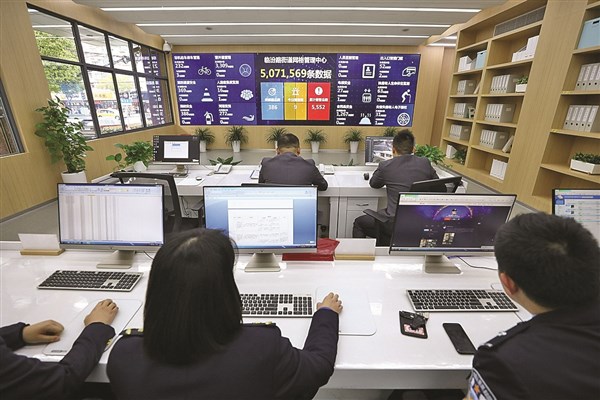
今日上海
临汾路街道打造神奇“社区大脑” - 2018年03月30日
Smart city makes lifestyle easier, safer

Smart cities promise a better lifestyle, but how does this vision of the future actually work in daily life? The Linfen Road Community may have one answer.
The community is installing “digital sensors” everyone in a prototype project. Among them: sensors in restaurant kitchens for smoke detection, sensors in sewers to monitor manhole cover theft, and sensors in the beds of the elderly to track their vital signs.
The sensors automatically upload information to a big data analytics platform. Alerts are triggered if the data clash with pre-set parameters.
It’s all part of what is commonly called the Internet of Things, the backbone of smart cities.
It means that everything about our lives will be connected to improve infrastructure, public utilities and services. It promises optimum efficiency and convenience.
Shanghai has been one of the pioneers in the global trend toward smart cities, and Jing’an has been designated to spearhead the effort in Shanghai because it’s home to the Shanghai Data Exchange, China’s leading big data center.
According to Tang Qifeng, chief executive of the exchange, a sensor network of data collection is part of a four-tier system aimed at creating a smart city. The second tier involves transmission networks, and the third addresses big data processing. The fourth will apply artificial intelligence to city operations.
By the end of this month, the Linfen Road Community will be covered with 21,000 digital sensors. By the end of September, 500,000 sensors are to be installed, covering 14 communities and towns in Jing’an.
So far this year, 323 sensors have been installed in the Linfen Road Community. Officials said they have received more than 600 useful alerts from the sensors, including 16 potential accidents that were nipped on the bud, according to Yu Linwei, chief of the Party’s Working Committee in the community.
“Many small retailers and restaurants don’t use electricity properly,” he said. “Several times, smoke sensors have alerted us to potential risks, and we were able to intervene before the situation escalated to fire.”
He added, “Actually, there are so many problems, like people living on high floors throwing trash off their balconies, drivers parking cars in banned areas and elderly people who live alone and suffer medical problems.”
Elderly care
Yu cited himself as one example.
Once, someone living upstairs to him didn’t properly extinguish the butt of a cigar before throwing it outside. It dropped on a quilt being dried on Yu’s balcony. Fortunately, he was at home at the time, so he extinguished it immediately.
“Now, we put sensors every six floors so we can detect offenders ,” he said.
The community has more than 100 people 80 years and older who live alone.
Three sensors have been installed in their complex, including one at a gate to ensure that they are back home safely.
One infrared sensor is installed in the living room of each of the elderly to detect movement. All other information about them is automatically deleted.
A third sensor is installed under their beds to monitor vital signs such as blood pressure and heart beat. The sensors also record how many times they wake up in the night.
“We have heard cases where the elderly have refused their children’s suggestions that they install monitoring cameras at home because they don’t like the idea of being watched 24 hours,” said Yu. “But our sensors just detect their conditions instead of capturing what they are doing. So, they have welcomed them.”
Zheng Weijing, director of the neighborhood in Lane 380 of Linfen Road, said the elderly aren’t charged for the sensors.
“They just have to live their lives the way they are accustomed,” he said. “If they take ill, we will automatically be alerted and send someone to check on them.”
Senior citizens suffering from dementia are equipped with Bluetooth bracelets that connect with community sensors to alert officials if they get lost.
“It achieves 24-hour monitoring,” said Zhou Jun, director of Jing’an’s science and technology authority. “Also, it eliminates barriers that restrict information to one department. Now the data is shared.”
The big data realm does worry people who fear that personal information may be leaked.
“We have a system to safeguard sensitive information,” said Tang.
Still, his team is calling for comprehensive regulation — at the city and even national level — to ensure that personal information is kept private.
As part of that effort, his team has been collecting and studying related rules adopted in Europe and the US since 1990.

